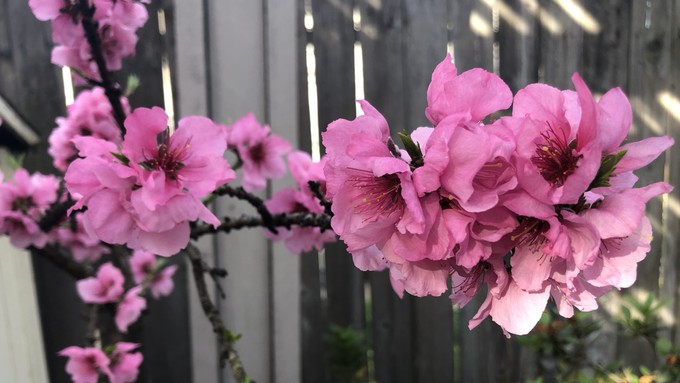
Overnight lows could reach 29 degrees, kill crops and damage plumbing

Wet today, frozen tomorrow? The predicted temperature drop could harm tender plants and blossoms on fruit trees. Kathy Morrison
Get ready for a big chill. Tuesday morning, the Sacramento office of the National Weather Service issued an “Urgent Weather Message” – freeze warnings for the next two nights.
With overnight lows expected to dip down to 29 to 32 degrees, back-to-back overnight freeze warnings will be in effect from 2 a.m. to 8 a.m. Wednesday and Thursday (March 1 and 2) for Southern Sacramento Valley-Carquinez Strait and Delta-Northern San Joaquin Valley, says the bulletin. That includes the cities of Sacramento, Fairfield, Suisun City, Stockton and Modesto.
Potential impacts could be costly, warns the weather service. “Frost and freeze conditions will kill crops, other sensitive vegetation and possibly damage unprotected outdoor plumbing.”
Those subfreezing temperatures will hit after the Sacramento skies clear and the rain stops late Tuesday, so there’s little chance of snow or graupel, says the forecast.
These two freezes to start March follow a rainy end to February. With rain on six consecutive days, Downtown Sacramento recorded more than 2 inches, including a record 0.91 inches Friday (Feb. 24). All this precipitation will keep soil moist, which is good frost protection. Moist soil retains heat better than dry soil. That difference can raise the temperature around trees and shrubs by three or four degrees – just enough to stay above freezing and frost damage.
That rain also means there’s no need for added irrigation; turn off the sprinklers and drip systems.
Making sure there’s no water in landscape pipes, tubes and heads can help prevent damage during freezing temperatures, too.
Between showers Tuesday, take action. Move plants or add frost covers. Harvest ripe citrus.
The weather service recommends these precautions: “Take steps now to protect tender plants from the cold. To prevent freezing and possible bursting of outdoor water pipes, they should be wrapped, drained, or allowed to drip slowly. Those that have in-ground sprinkler systems should drain them and cover above-ground pipes to protect them from freezing.”
For more tips on freezing and frost: https://ipm.ucanr.edu/PMG/GARDEN/ENVIRON/frostdamage.html.
Comments
0 comments have been posted.Sacramento Digs Gardening to your inbox.
Sites We Like
Garden Checklist for week of July 21
Your garden needs you!
* Keep your vegetable garden watered, mulched and weeded. Water before 8 a.m. to reduce the chance of fungal infection and to conserve moisture.
* Feed vegetable plants bone meal, rock phosphate or other fertilizers high in phosphate to stimulate more blooms and fruiting. (But wait until daily high temperatures drop out of the 100s.)
* Don’t let tomatoes wilt or dry out completely. Give tomatoes a deep watering two to three times a week.
* Harvest vegetables promptly to encourage plants to produce more. Squash especially tends to grow rapidly in hot weather. Keep an eye on zucchini.
* Pinch back chrysanthemums for bushy plants and more flowers in September.
* Remove spent flowers from roses, daylilies and other bloomers as they finish flowering.
* Pinch off blooms from basil so the plant will grow more leaves.
* Cut back lavender after flowering to promote a second bloom.
* It's not too late to add a splash of color. Plant petunias, snapdragons, zinnias and marigolds.
* From seed, plant corn, pumpkins, radishes, winter squash and sunflowers.